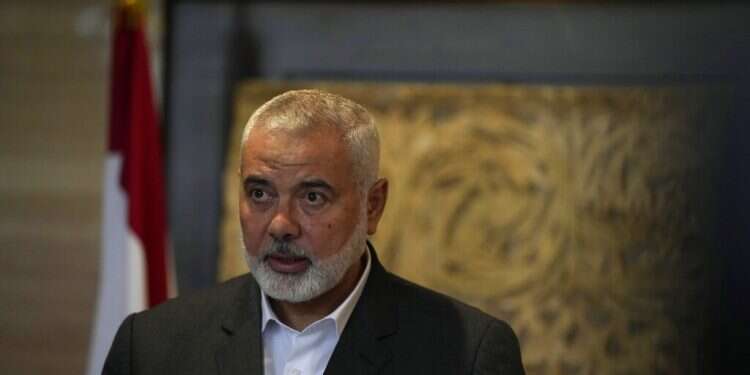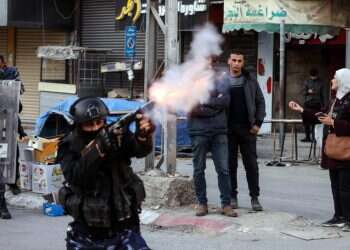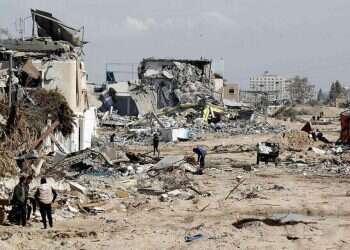Hamas may organize border riots on the Gaza Strip's southern border with Egypt in an effort to pressure Cairo to reopen the Rafah Border Crossing, which the Egyptian shut in response to the recent escalation in rioting on the border with Israel, according to a report in Hezbollah-aligned Lebanese newspaper Al-Akhbar Wednesday.
Follow Israel Hayom on Facebook and Twitter
The terrorist group may also violate a 2017 agreement with Cairo by removing Hamas forces from the border area, thereby making it easier to smuggle items into Gaza, Al-Akhbar reported. Hamas officials have also discussed turning up the pressure on the Gaza-Israel border in an attempt to pressure Cairo to reopen the border crossing.
The report seems to contradict earlier reports from Egyptian sources, who told the London-based pan-Arab newspaper Al-Araby Al-Jadeed Tuesday that Hamas politburo chief Ismail Haniyeh was looking to quell Egyptian anger over recent tensions on the Gaza Strip's border with Israel.
According to that report, Haniyeh informed Egyptian officials he was willing to renew talks with Israel on a ceasefire and a prisoner exchange deal.
Haniyeh reportedly made the remarks following a visit by Abbas Kamel to Tel Aviv earlier this week, during which the Egyptian intelligence chief convinced Prime Minister Naftali Bennett and National Security Adviser Eyal Hulata to agree to ease restrictions on the terrorist enclave.
Egyptian sources confirmed Haniyeh asked Cairo to reopen the country's Rafah Border Crossing with Gaza.
In coordination with Israel, Cairo is said to have closed the Rafah Border Crossing in an effort to pressure Hamas, Palestinian sources told Al-Akhbar.
According to a separate report in London-based pan-Arab newspaper Al-Araby Al-Jadeed, senior Egyptian intelligence officials had warned the Hamas leadership over recent events on Gaza's border with Israel. They said Cairo closed the Rafah Border Crossing after the terrorist organization violated an agreement to rein in riots on the Gaza border Saturday.
"There was an agreement between senior Egyptian intelligence officials and Hamas leadership on full control of the demonstrators and avoiding the border fence or friction with security forces. This was before the events got out of control, and dozens of Palestinians were wounded and [someone] opened fire on an IDF soldier," the official said.
This week has seen the heaviest cross-border fighting between the two sides since the Israel Defense Force's Operation Guardian of the Walls in May.
Hamas-backed activists have launched incendiary balloons into southern Israel several times in recent weeks, setting fires on the other side of the border. On Saturday, they held a violent demonstration along the Israeli border fence during which one rioter, a member of Hamas' security forces, critically wounded 21-year-old undercover Border Police officer Barel Hadaria Shmueli. Shmueli, a resident of the central Israeli city of Be'er Ya'alov is currently being treated at Soroka Medical Center in Beersheba, the military said. He is in critical condition.
Early on Tuesday, Israeli Air Force jets carried out a series of airstrikes on Hamas targets in response to incendiary balloons. The IDF said that Hamas fired machine guns into Israel, drawing an additional airstrike. No casualties were reported on either side.
By the afternoon, however, the terrorists were launching the balloons again.
The Egyptian officials noted the sensitive timing of the talks, noting plans for additional "Marches of Return" on the border and expressing concern the situation could spiral out of control. In particular, the Egyptians noted "domestic pressure on the government in Israel, which could push it toward a military response, something that could spur a response from the [Gazan] factions in light of the expectation Hezbollah will stand with Gaza and drag Israel into [a conflict] on another front."
The officials added Cairo had clarified their demand Hamas and the other factions in Gaza stop the riots.
In talks with Egyptian intelligence chief Abbas Kamal, National Security Adviser Eyal Hulata expressed anger over the increasingly aggressive tone adopted by Palestinian faction heads in recent days and the attack on Shmueli. While Hamas said the officer's shooting had not been planned, the Egyptians clarified they would not accept such an excuse, the officials said.
According to the Al-Akhbar report, the Egyptian pressure comes as Hamas refused to whittle down its list of demands on either the humanitarian situation in Gaza or a possible prisoner exchange deal. Hamas has also refused to halt its efforts to pressure Israel until Jerusalem implements the easing of restrictions discussed between the sides, including allowing the transfer of Qatari funds into the enclave.
Hamas has demanded the funds be transferred this week, arguing a transfer in September would only serve to buy Israel time in negotiations for a deal.
The Egyptians, for their part, conditioned the reopening of the border crossing on a number of goodwill gestures from Haniyeh. They explained that any unilateral move by Hamas could damage ties between the terrorist organization and Cairo.
According to the Al-Akhbar report, the Egyptian officials hope to take advantage of the new Israeli government's approach to Gaza, which they said differed from that of the previous government, to reach a permanent ceasefire.
Meanwhile, as part of its efforts to ready security forces for a continued confrontation with Gaza, the IDF set up a roadblock in the Gaza periphery area for the first time since May's Operation Guardian of the Walls.
Subscribe to Israel Hayom's daily newsletter and never miss our top stories!




